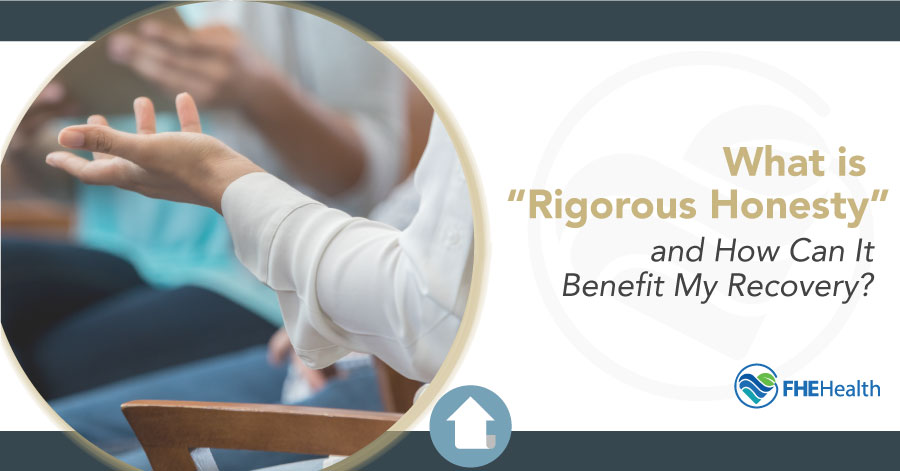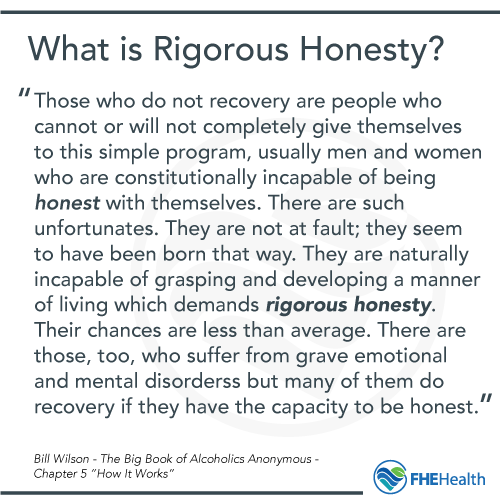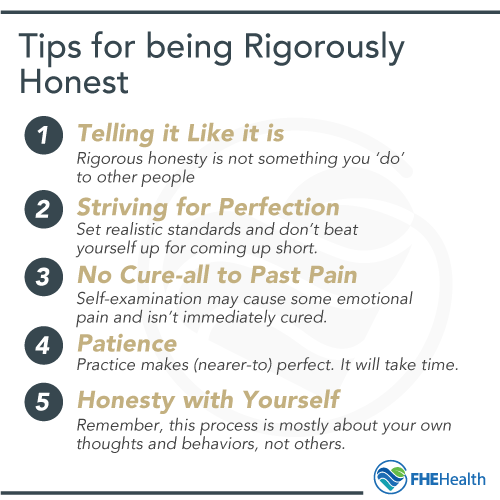
Updated April 5th, 2023
“It’s okay if I have a drink now and then. I beat my addiction and I don’t have to worry about it any longer.” This statement is an example of a lie people with alcohol addiction tell themselves. It’s a form of denial, often to themselves and family.
A key component of getting sober is being honest with yourself and your family. This is known as rigorous honesty, and it’s one of the building blocks of the 12-step program. Honesty in recovery is an important foundation for your mental, emotional and physical recovery from addiction. So, are you being honest in your recovery?
What Does Rigorous Honesty Mean?

People with an addiction often tell themselves and others lies. It’s not always about drinking alcohol. A person with an addiction may lie or make promises they can’t keep to encourage loved ones to remain a part of their lives. They may lie to avoid facing rejection or reality. Some people lie because they’re ashamed, afraid or trying to live a fantasy life of balancing it all.
The rigorous honesty definition wipes all that away. In short, it’s making the commitment to be 100% honest all the time. It’s not okay to tell big lies or small ones. It’s also not okay to hide information or simply not share key information. Because the addicted mind will drive negative behaviors and thoughts like this, it’s essential to commit to a life of honesty. And that doesn’t just mean truth-telling — it’s also about self-examination.
How Self-Examination is Needed for Rigorously Honest?
Living in true honesty means making the decision to tell the truth, but it also means fully understanding the truth. Examining, arriving at and accepting the hard truths of your life is a key aspect of recovery.
In the first step of a 12-step program, drug and alcohol addicts must commit to doing a personal inventory that makes them understand that they’re powerless against their addiction. Though it may feel harsh, this degree of honesty is the first step to understanding yourself, what drives you and why you can’t conquer addiction on your own.
In time, you’ll learn how to be honest with a higher power with Step 4 and Step 5. Staying honest will come up in Step 8 and then again in Step 9. Over the course of your recovery, you’ll reckon with the role of honesty in sobriety and how to practice honesty in every facet of your recovery.
Why Is Honesty So Important?
Being honest in recovery allows you to create and build authentic relationships. It allows you to face the struggles and failures you’ve had. It also enables you to create important boundaries for yourself to ensure recovery. It’s not possible to live a life of addiction without lies. It’s also not possible to fully recover if you’re not being truthful. It’s a part of life for those in recovery.
How Rigorous Honesty Helps Addiction Recovery
 The relationship between honesty and sobriety is not always cut and dried. Learning how to be honest or how to live an honest lifestyle is a complex process with numerous ups and downs. Take into consideration where you are today. What lies are you living and telling people each day? Even if it seems impossible to overcome the situation you’re in right now, there are tools to support you. Consider a few common areas of confusion.
The relationship between honesty and sobriety is not always cut and dried. Learning how to be honest or how to live an honest lifestyle is a complex process with numerous ups and downs. Take into consideration where you are today. What lies are you living and telling people each day? Even if it seems impossible to overcome the situation you’re in right now, there are tools to support you. Consider a few common areas of confusion.
Rigorous Honesty and Telling It Like It Is
Rigorous honesty in addiction treatment shouldn’t hurt you or others. There’s no level of criticism here. While it’s important to note the negative aspects of your life, seeing the good in yourself is just as important.
It’s not beneficial to wield honesty to cause chaos in your life or use it as a way of leveling the score. Rigorous honesty is more inward-facing, about how you’ve examined your own behavior and past and how it will affect your actions going forward.
Don’t Strive for Perfection
Mistakes will happen. While your goal is always to strive for honesty, being 100% honest all the time isn’t realistic. When you’re trying your very best and a lie slips through, recognize it, work to admit what happened, then move back towards honesty.
You Can’t Resolve Past Pain
Another common misconception some people experience is the belief that honesty alleviates the pain in your past. But there are consequences to a lie, and you can’t expect people you’ve hurt over the years to forgive you because you’re being honest now. There’s no quick fix here. It takes time to earn back respect and trust. The only way to make it possible is to walk in truth and prove yourself with consistency.
Reaching Rigorous Honesty Can Take Time
Habits take some time to learn and to break. It can take you weeks to unlearn a bad habit and overcome it. It may even take you longer than this to learn how to be rigorously honest with yourself and your family. Don’t expect it to be as easy as flipping a switch. The 12 steps from AA are designed to be a long-term project, just like you.
Be Honest With Yourself
Rigorous honesty is most valuable when you apply it to yourself. Know who you are, and understand the value of being honest about your actions. In turn, you can work toward becoming the kind of person you want to be in the future.
It’s said that the truth will set you free, and idiomatic as it may be, there’s a clear link between recovery from addiction and honesty. The importance of honesty in recovery can’t be overstated, so make a commitment today to be honest during your recovery.
Practicing Rigorous Honesty
The best way to reap the benefits of rigorous honesty in recovery is to practice it every day. Use the following tips to practice rigorous honesty daily:
- Consider your values. Set aside a little time each day to reflect on your values and beliefs. Have you lived according to them today?
- Communicate with integrity. Speak truthfully and openly, even when it’s uncomfortable. Avoid exaggerating or downplaying situations to avoid conflict or please others. Communicate with clarity, empathy and respect, and at the end of each day, look back on your interactions with others. Did you communicate honestly?
- Take responsibility. Be accountable for your actions and their consequences. Avoid blaming others or making excuses. Acknowledge your mistakes, learn from them and make amends when necessary. Contact others to apologize if you feel you’ve wronged them.
- Set healthy boundaries. Be clear about your limits and boundaries, and communicate them to others respectfully. This includes saying no when necessary, taking breaks when needed and protecting your well-being. Each day, ask yourself if you said no when you needed to.
- Keep a gratitude journal. Gratitude helps cultivate a positive mindset and can promote honesty. Studies show that practicing gratitude can dramatically increase happiness. Take time each day to reflect on what you’re grateful for, and express appreciation to others when appropriate.
Remember that practicing rigorous honesty is a daily habit that requires effort, self-awareness and commitment. By consistently practicing these habits, you can develop a more honest and authentic approach to life, leading to healthier relationships, personal growth and recovery from addiction.
Rigorous Honesty Versus Brutal Honesty
When you first come across the concept of rigorous honesty, there’s a danger of getting it mixed up with brutal honesty. However, there are important differences between these two types of honesty.
Rigorous honesty is a practice of being truthful with oneself and others in a thoughtful, respectful and empathetic way. It involves being truthful about your feelings, thoughts and behaviors, and communicating them in a way that’s clear, compassionate and respectful. Rigorous honesty also involves taking responsibility for your actions, being accountable for their consequences and setting healthy boundaries.
On the other hand, brutal honesty is an approach that focuses solely on telling the truth without regard for the impact it may have on others. It involves being blunt, direct and often insensitive in delivering feedback or opinions. Brutal honesty may come across as harsh, critical or hurtful and can damage relationships and trust.
FHE Health Provides the Resources to Support You
Rigorous honesty can begin by admitting it’s time to get help for yourself. At FHE Health, we offer the treatment solutions you need for drug and alcohol addiction in a compassionate, supportive environment.






